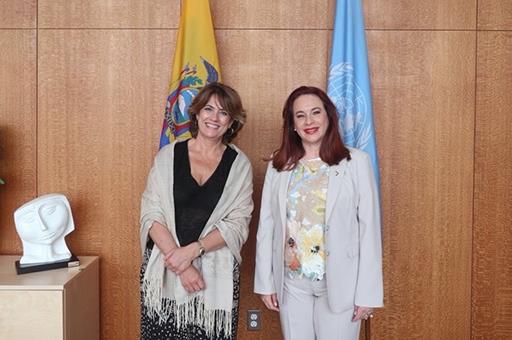In New York
Dolores Delgado defends the values of justice, peace and citizen participation as pillars of the Rule of Law while speaking at the UN
News - 2019.7.9
While taking part in the seminar on 'Strengthening the Rule of Law and Human Rights to achieve Peaceful, Fair and Inclusive Societies' being held at the UN as part of the 2030 Agenda for Sustainable Development, Dolores Delgado underlined the "unavoidable commitment" from the Government of Spain against terrorism and organised crime, "which attack the very roots of social harmony and freedom".
During her visit to the UN Headquarters in New York, the first stop on her trip to the United States, the Spanish Minister for Justice also held meetings with the President of the United Nations General Assembly, María Fernanda Espinosa Garcés, and the Senior Advisor on Policy to the Secretary-General of this international organisation, Ana María Menéndez, before flying to Washington, where, on Tuesday, she is meeting with the US Attorney General, William Barr..
In her speech at the seminar, Dolores Delgado referred to the efforts made by the justice systems in Ibero-America to achieve the sustainable development goals and highlighted international legal cooperation as one of the best tools in the fight against terrorism.
The Spanish minister recalled that Spain led the process in 2016 to approve Resolution 2322 of the United Nations Security Council, calling on Member States to engage in better legal cooperation and make all resources available to facilitate criminal investigations and processes. Dolores Delgado said that her ministerial department "is doubling its efforts to enhance that cooperation" through new regulatory instruments and strengthening the climate of trust with Spain's partners in the European Union and the Ibero-American Community.
Regarding Ibero-American affairs, the Spanish minister mentioned the work being done by the Ibero-American International Legal Cooperation Network (IberRed) and the Conference of Ibero-American Justice Ministers (COMJIB), which, at the end of this month according to Dolores Delgado, will approve a new treaty in Medellin (Colombia) on electronic communications between the Member States of this international organisation that will represent a step forward in legal cooperation against crime, terrorism and impunity.
Dolores Delgado also referred to the National Strategy against Organised Crime and Major Crime 2019-2023 approved by the Government of Spain, the cornerstones of which include promoting international coordination in the fight against the most serious offences. Along the same lines, the recent reform of the Criminal Code seeks to transpose a number of European directives on criminal matters into Spanish law and tackle other international affairs related to the same issue.
In terms of combatting the financial flows that support cross-border crime, the Spanish minister highlighted her ministerial department's efforts to promote activity by the Office for the Recovery and Management of Assets (Spanish acronym: ORGA) stemming from organised crime, which has been especially strengthened by the opening of a delegation in Algeciras (Cadiz) to support the actions undertaken by the Ministry of Justice and the State law enforcement agencies in the Campo de Gibraltar.
Regarding the fight against corruption, Dolores Delgado underlined the efforts being made by Spain to comply with international standards. The Group of States against Corruption (GRECO) of the Council of Europe recently recognised the work carried out by Spain to guarantee the independence of the judiciary and public prosecution service, and to strengthen the transparency of Spanish institutions. She went on to say that Spain has established objective criteria for appointing the most senior civil servants in the judiciary and enhanced the transparency of relations between the Government of Spain and the public prosecution service thanks to the reform of the Constitutional Law on the Judiciary approved in December.
In her speech, the Spanish Minister for Justice also referred to the action taken by the Government of Spain to help the most vulnerable groups when they become victims of abuse, exploitation and trafficking. On the one hand, a firm commitment has been made to the State Pact against Gender-based Violence, which includes almost 100 measures affecting the justice system. These measures include the addition of a gender-based approach to the training programmes developed for judges, public prosecutors and other members of the legal system and improved legal aid for victims, policies aimed at eliminating barriers between institutions and the women who suffer gender-based violence.
On the other hand, the Ministry of Justice has also played an active role in the Government of Spain's action to protect children. The Draft Constitutional Law on Comprehensive Protection against Violence for Children and Teenagers, which could not be formally passed because of the early election process, embodies a broader concept of violence, a new catalogue of offences against children and teenagers via the Internet and longer limitation periods for sexual abuses against children, among other protection measures.
The second day of the Minister for Justice's trip to the United States is already under way in Washington, where she is meeting the Attorney General, William Barr, on Tuesday. She will also take part in a public Q&A session alongside the Executive Secretary of the Inter-American Commission of Women of the Organisation of American States, Carmen Moreno, entitled "Women and Leadership".
Non official translation





